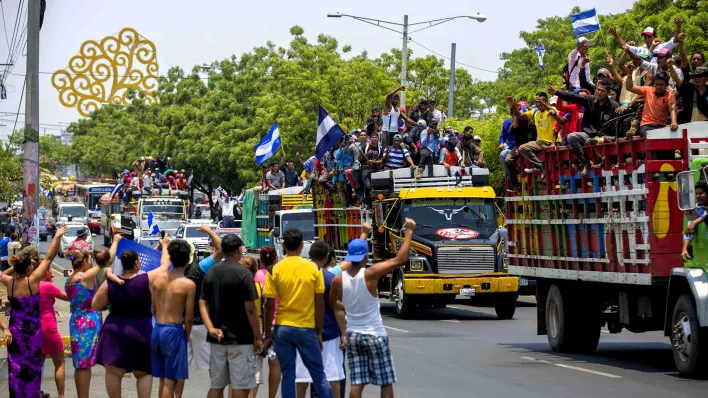
Thousands of Nicaraguan peasants (“campesinas”, “campesinos”) have gone into exile, entire families were forced to seek safety in Costa Rica, and their capacity to mobilise and lead social processes in Nicaragua has signified a loss of territorial identity.
The lives of Nicaraguan peasants are closely tied to working and caring for the land, its minerals and its resources. Before 2013, their lives were different, their activities revolved around growing and harvesting crops. However, that year marked a starting point in the creation of the peasant movement to oppose Law 840, or “Canal Law”, which sought to undermine peasant’s autonomy and integrity. From that moment on, there were several years of repression and persecution. In 2018, the civil uprising of the Nicaraguan citizens began, leading thousands of people, including peasants, to take to the streets and travel across the country to the major cities to join the protests against the social security reforms and the escalation of violence against students and youth.
The peasant movement organised civil demonstrations in Nueva Segovia and the surrounding area, and thousands of peasants arrived in Managua to join the demonstrations and support the youth. Nicaragua then entered a spiral of violence that continues to this day.
Resistance alternatives
Like other sectors, the exiled peasants have faced countless challenges in exile, above all the separation from their land has taken away their livelihood and they have had to find alternatives to continue defending their land rights, their territory, and the rights of the Nicaraguan people.
Within the different initiatives is Francisca Ramírez Torres, known as “Chica”, a Nicaraguan peasant leader from the municipality of La Fonseca, department of Nueva Guinea. On 25 September 2018, she, along with many others, was forced into exile in Costa Rica, fleeing the Nicaraguan government’s repression. She was criminalised for her work as a defender of peasant rights and for her leadership within the peasant movement.
“Deciding to become a human rights defender is often unplanned, but when you become socially aware, with so many inequalities and injustices around you, it awakens a commitment that drives you to raise your voice to make visible the reality that affects your people” (Francisca Ramírez).
Francisca recalls: “I never imagined that we were going to be displaced when we had been fighting for five years not to be forcibly displaced. It was very sad to take the decision to go into exile when we hadn’t planned to. Fortunately, I received a lot of solidarity from human rights organisations who were looking out for my safety and welcomed me when I managed to cross the border”.
On arriving in Costa Rica, the peasant movement intended to stay for three months, while they developed their plans, and then return to Nicaragua to continue demanding justice, democracy and freedom by taking to the streets through civil demonstrations. However, the possibility of a prompt and safe return became ever more distant.
Faced with this context, in mid-2019, with the support of social organisations, they managed to set up a camp in Upala, in northern Costa Rica. It is an autonomous space with time to work the land, to guarantee food security, and to continue generating collective advocacy actions that can contribute to the struggle for democracy, justice and Nicaraguan freedom, led by “Doña Chica”.
This intergenerational coexistence initiative, which brings together over 30 families, has its own rules that range from respecting opinions, identities, nonviolence within the family, the sharing of cleaning tasks for collective spaces, childcare, a protocol in the event of a COVID-19emergency, and participation in training spaces that contribute to human rights empowerment and collective action based on their civic commitment with Nicaragua.
We also find other leaders such as Nemesio Mejía who, together with sectoral representatives in exile, have joined forces to generate spaces for cohesion, discussion and reflection on the current needs of peasants, but also the projections they consider relevant for a new Nicaragua. Organisational efforts have allowed them to strengthen networks with local and international organisations, helping them to share concerns about what is currently happening in Nicaragua and the impact of the violence for those in exile.
The different sectoral representatives have been able to identify concerns and respond to the most basic needs through the coordination of networks, especially those that have arisen as a result of COVID-19; illness or loss of employment due to health restrictions. However, despite the difficulties, they have found sufficient strength to remain united, to acquire tools to strengthen critical thinking, context analysis, risk identification, and physical and digital security strategies, as well as to improve communication regarding the challenges inherent in coming together and advancing collective actions.
Many have also acquired new tools to work the land and have been able to generate economic resources for their sustainability and to continue working in coordination as a grassroots social movement.
The struggle continues!
Advocacy actions are being carried out by the different representatives in exile to provide updates on their context analysis, as well as training and knowledge exchanges, and continuing the call for justice in Nicaragua.
The peasant movement’s activism is ongoing and these voices will not be silenced. Regardless of where they are, Nicaraguan peasants will raise their voices and maintain their commitment to do so, as they have been doing since 2013.
PBI Nicaragua en Costa Rica
[Fotografía: Fransk Martínez]
This article is part of PBI Nicaragua in Costa Rica’s publication “Nicaraguan voices in resistance”, a project that unites different voices from Nicaraguan exiled human rights defenders. It is a tribute to the Nicaraguan organisations and collectives that, from exile, work continuously in the defence of human rights, bringing together the voices and testimonies of those who promote this work through non-violent action and in a culture of peace.
